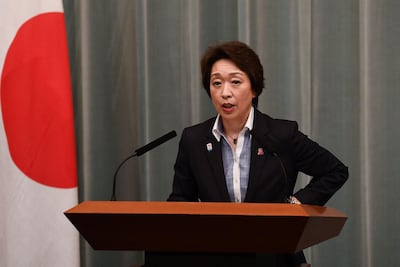Women in the professional world, more often than not, have a tough time facing challenges built in to a corporate system. It is already hard enough to get a place at the table to "lean in" and be heard. But when men in senior leadership positions perpetuate myths to keep women out of those roles, I am not sorry when they are shown the door.
Last week it was the turn of Yoshiro Mori, 83, former prime minister of Japan and more recently, the former head of the Tokyo 2020 Olympics organising committee, for saying "women talk too much".
In the context of increasing the female presence on the Olympic committee board – it has 24 members, five of whom are women – Mr Mori said that meetings with too many female board directors would "take a lot of time" as "women talk too much". There was naturally an uproar over his statements. And at first he merely apologised, presuming perhaps that it would bat away the noise. But due to pressure from female lawmakers and sponsors over his sexist remarks, Mr Mori finally resigned on February 12.
But such attitudes about women are more common than some might think. A few years ago, a number of self help books falsely claimed that women spoke 20,000 words per day as against the 7000 spoken by men. This has been roundly debunked. Studies have shown that women in meetings speak far less than men, and even when they do, their interventions are much shorter. The truth is that when women say anything at all, it is often perceived as too much. The tolerance in some male-dominated spaces for women's opinions is often close to zero. So when those in positions like Mr Mori blithely allege that women talk too much, we see stereotypes of women perpetuated yet again.
When asked where he got such ideas from, Mr Mori said: “I heard somebody say…”, and then added to the damage: “I don’t talk to women that much these days, so I don’t know".
This is why when US Vice President Kamala Harris stood up to the constant interruptions during the presidential debates with Vice President Mike Pence with her now famous interjection – "I'm speaking" – women around the world whooped in recognition, having experienced being similarly cut off mid-sentence.
But even when women have overcome exclusions in the room, created space to be heard, and tactfully dealt with the perception that fellow women who talk "too much" are seen as aggressive or taking up more authority than they are due, who is actually paying attention, forget about crediting them?
Often, women’s ideas are dismissed until a man repeats them, at which point he might take the credit. Exceptions notwithstanding, this has been known to happen all too often. The female staffers in former US president Barack Obama’s administration came up with a now-famous way to deal with women’s ideas being usurped by others, through a strategy they called ‘amplification'. When a woman made a point, other women would repeat it, and attribute it to its author. This forced the men in the meeting to recognise the origin of the idea and credit it to the right person, rather than claim it as their own.
But despite these victories, a woman’s credentials when speaking are too often diminished. Last week on the BBC, Professor Claire Hopkins appeared on the Breakfast news show as part of her campaign to have the loss of smell and taste taken more seriously as symptoms of Covid-19. Her male colleague's caption on the screen read ‘professor’, whereas she was simply addressed by her first name, and without her title displayed. Professor Hopkins was right to point out later, tweeting about an 'unconscious bias': "We are both Professors and Consultant ENT surgeons... why don’t we get treated in the same way?"
Her qualification and designation mattered to the interview. As she pointed out in her complaint, it wasn’t the first time it had happened. Undermining women’s credibility in subtle and overt ways is commonplace.
This week in the UK it was the unknown Jackie Weaver who became a national treasure overnight. While Mr Mori, Ms Harris, the Obama staffers and Professor Hopkins were on a national stage battling it out, Ms Weaver could have stood in for any woman in a local community meeting.
She was parachuted into a Zoom meeting of Handforth Parish Council amid allegations of bullying and bad behaviour that had been taking place. Parish Councils are the lowest tier of local government and can represent populations of fewer than 100 to up to 100,000 people.
At one point the chairperson of the council raged at her: "will you stop talking?" and "you have no authority". The vice chairperson joined in the rudeness, accused her of lack of expertise, claimed she had not read the standing orders and yelled: "read them and understand them!"
Her response was simply to kick the chair out of the meeting. With a click of a button he was gone. She wasn’t apologetic about it. And had about her a sardonic calmness. She took the action that needed to be taken.
No wonder Ms Weaver was splashed across the news the following day, the hashtag of her name was trending, and her image was on celebratory T-shirts, mugs and memes.
Whether at the level of Olympic Committees, like Mr Mori, or at the level of a parish council, Ms Weaver's simple action was the perfect message to patronising men everywhere, all those who think women should "stop talking".
Shelina Janmohamed is an author and a culture columnist for The National



